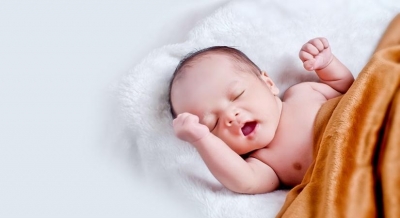New York, Jan 25
Full-term babies born to mothers who were infected with Covid-19 during pregnancy had three times the risk of having respiratory distress compared with unexposed infants, even though they themselves were not infected with the virus, says a study.
However, the risk was significantly lower when the mothers infected during pregnancy were previously vaccinated, revealed the findings, published in the journal Nature Communications.
The researchers found that in-utero exposure to SARS-CoV-2 sparked an “inflammatory cascade” in the infants, increasing the risk of a breathing disorder that most often strikes prematurely born infants.
“We found unusually high rates of respiratory distress shortly after birth in the full-term babies born to mothers who had Covid-19 during pregnancy,” said Dr. Karin Nielsen, Professor of paediatrics in the division of paediatric infectious diseases at the David Geffen School of Medicine at University of California-Los Angeles.
“The mothers had not been vaccinated prior to acquiring Covid, indicating that vaccination protects against this complication,” Nielsen added.
To trace how respiratory distress develops following in-utero exposure to SARS-Cov-2, the researchers conducted a study called proteomics that examines the structure and functions of proteins and how they affect cells.
They found that whip-like structures called motile cilia that help clear mucus from the respiratory tract did not function normally in the exposed infants stricken with respiratory distress.
In addition, the infants had higher production of antibodies called immunoglobulin E (IgE). Of the 221 mothers enrolled in the study, 151 (68 per cent) were unvaccinated prior to infection, with severe or critical Covid disease present in 23 women (16 per cent), compared with only three (4 per cent) of vaccinated mothers.
The researchers found that 34 (17 per cent) of 199 exposed infants followed in the study had respiratory distress, which is a very high frequency, as in the general, unexposed population respiratory distress happens in 5 per cent to 6 per cent of babies only.
Of babies with respiratory distress, 21 per cent were born to mothers with severe or critical Covid-19, while only 6 per cent of babies without respiratory distress were born to women with severe disease, a finding that was statistically significant.
Of the 34 infants with respiratory distress, only five (16 per cent) were born to mothers vaccinated prior to infection, compared to 63 (41 per cent) without the breathing disorder, indicating that vaccination had a protective effect.
According to the researchers, even one mRNA vaccine dose prior to infection significantly reduced the odds that a full term infant would develop respiratory distress.
“Not only do our results show higher rates of respiratory distress in SEU (SARS-CoV-2 exposed uninfected) infants when compared to the general population,” the researchers write, “but we observed more cases of respiratory distress at later gestational ages than anticipated, when neonates should presumably have more mature lung anatomy.”










